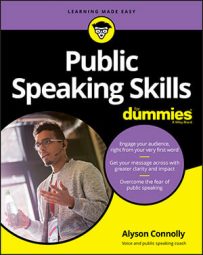Breathe to alleviate stuttering
“Don’t tell me,” you’re saying. “It all comes down to breathing, doesn’t it?” Of course it does. Breath is the thing that makes your speech go round, baby. It’s the material you need to make sound.As I say elsewhere, slow down your breath. Breathe deep as if into your abdomen. When you breathe from your upper chest, it stresses you out. You can’t get much air into your body that way — you can start to look like a person on the verge of drowning. You take short gasps of air, which can even make you hyperventilate. Breathing calmly helps you gain control, thereby increasing your confidence.
Many politicians, actors, and singers stutter, but we never know it until we hear them being interviewed. Singing can help. When a stutterer sings, the rhythm can prevent them from stuttering. In their book Understanding Stammering or Stuttering (Jessica Kingsley Publishers, 2012), authors Elaine Kelman and Alison Whyte surmise that the combination of melody and speech, which come from different parts of the brain, may result in greater fluency. Singing words that he had trouble speaking helped King George VI. It was much safer than the advice he was previously given, which was to speak with marbles in his mouth. Poor guy could’ve choked. So try singing lines from your speech. Try to feel that rhythm when you’re speaking.
Roll with word flubs
It wasn’t too long ago that most people believed stutterers had a sort of cognitive delay. To this day, some stutterers and others believe that. A listener may wait patiently for a stutterer to get out those words, but seeing how hard a time the stutterer is having can cause anxiety. Humans are empathy machines a lot of the time, after all.I have worked with a few people who stutter, and I tell them, like I tell all my clients, that if they feel they haven’t presented their speech as well as they practiced, or if they do stutter in the speech — just let it go. You really can’t do much more than that. Nobody’s perfect. As a speaker, you have a story to tell, and we want to hear it. If you appear flustered and frustrated because you stutter when giving a speech, the audience will pick up on that frustration. They’ll be worried about you — and that’s when they’ll lose their grip on your message.
Exercise: Sooth the stuttering storm
Try to drop your breath deep into your abdomen. Breathe in for a count of four, and then out for a count of four. If you still feel the breath dropping deep into your abdomen after four, go ahead and increase the count — but only count to a number where you can breathe in and out without feeling any tensions in your body.Now that you’re breathing slowly, it’s time to speak slowly. Speak some one-syllable words: “Cat, made, time, seam.” Then graduate to multi-syllable words: “Doorknob, baseball, crossover, moonlight.” Now move along to sentences of some complexity: “The public speaker, who was giving a speech about the health benefits of bananas, was thoroughly engaging.”
Take a favorite book and spend some time reading out loud. Find a place in your house where you can be calm. Brew some tea or coffee, then read. And as you read out loud, make the time to breathe and really form your words.
There could be many reasons for your stutter. Seeking professional help from a speech language pathologist may be beneficial.

